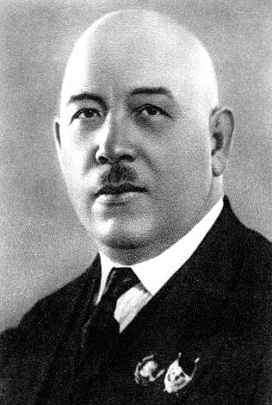Demyan Bedny (Demyan Bedny)

Poet. Largely forgotten today, Demyan Bedny once ranked among the Soviet Union’s most famous authors. His simple, song-like topical verses, filled with slapstick wit and satire, were widely read in the 1920s and 1930s. Boris Pasternak claimed he saw “the spirit of the people” in his work. Born Yefim Alekseyevich Pridvorov in Gubovka, Ukraine, he studied at St. Petersburg University and became a committed liberal after the failed 1905 Russian Revolution. He adopted the pseudonym Demyan Bedny, which means “Damien the Poor”, when he began penning doggerel for underground Socialist publications. In 1912 he joined the Bolsheviks and began corresponding with V.I. Lenin, who eventually became a friend and supporter. After Lenin seized control of Russia in 1917, Bedny devoted his services to the Communists and churned out everything from epics glorifying the Revolution to propaganda jingles and poster captions; this gave him a position of considerable influence in the Kremlin, where he was officially regarded as the greatest “proletarian poet”. He received the Order of the Red Banner in 1923 and the Order of Lenin in 1933. Many of his poems, written for “Pravda” and other newspapers, attacked real or perceived enemies of the State in the form of crudely humorous fables. His later writings were stridently anti-religious. The immense power Bedny had in the Soviet literary establishment began to crumble under Stalinist oppression of the arts in the mid-1930s. At the height of the pre-war purges, when hundreds of authors were being shot or sent to the gulag, Bedny produced his satirical narrative “Men of Might” (1937), which mocked early Russian history and its Orthodox saints. This proved a political blunder – or at least provided an opportunity for the regime to humble one of its cultural stars. Stalin himself ruled that the arrival of Christianity in Russia was “a progressive occurrence” and that “Men of Might” was in historical error. Bedny was stripped of his Party membership and kicked out of the Union of Soviet Writers in 1938, and while he was allowed to publish patriotic verse during World War II he never regained favor with the Party or public. In the early 1960s, long after Bedny’s death, Soviet Premier Nikita Khruschev attempted to revive his reputation to counter modernist literary trends, but this failed to generate renewed interest in his poetry. Present-day historians regard Bedny’s work as “poetic journalism”, and of little but documentary value. (bio by: Bobb Edwards)
Born
- April, 13, 1883
- Hubivka, Ukraine
Died
- May, 05, 1945
- Moscow, Russia
Cemetery
- Novodevichy Cemetery
- Moscow, Russia


